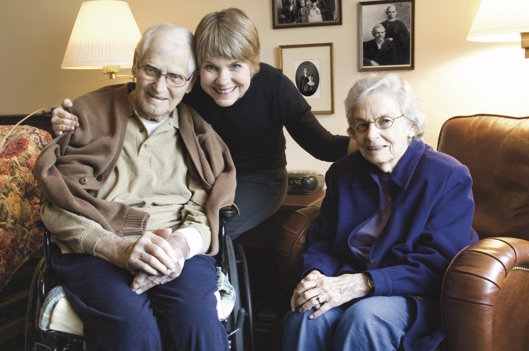“Old age ain’t no place for sissies.” ~Bette Davis
I’m sure nearly all of us can conjure up a difficult or frustrating conversation that we’ve had with aging parents or grandparents. It can be challenging even on a good day, but throw in medical decisions, independence issues, driving, etc. and it can be downright difficult for everyone involved.
2 Things to Keep in Mind
While in our earlier years, we may only experience loss every once in a while, like the loss of a job, loss of relationships, etc., the older years can be marked by one loss after another with no time to recover or grieve. As the losses mount, it takes an emotional and physical toll.
In his book, “How to Say it to Seniors: Closing the Communication Gap with Our Elders,” author David Solie says, “Once we learn the importance of assisting and not fighting [the seniors in our lives], communication will become more pleasurable, productive, and effective.” I have found this book to be a great resource, and we’ve pulled the following communication strategies from it. I hope you’ll find them helpful!
9 Communication Strategies for Aging Parents
- Acknowledge the magnitude of the loss. Let them know that this time of life is hard and it’s okay to admit that. Start with phrases like, “I understand how difficult this must be…” “I imagine this loss is really devastating…” or “I know it’s hard to keep going…”
- Ultimatums never work. Ultimatums usually backfire with most every age group, but especially with seniors. Just don’t do it.
- Stand by your elders! Consistent support is really important, especially when it comes to things like medical treatments. Seniors, like the rest of us, need to be able to pout, ponder, obsess and take a stand. Allow them the freedom to do that without getting annoyed or withdrawing.
- Give them room to change their mind. Create a comfort zone where they can come to you without losing face if they change their mind.
- Watch your tone. Failure to do this can feel like confrontation or lecturing, both of which puts people on the defensive and accomplishes nothing.
- Consider “NO!” the warm-up answer. There are many times when the automatic first response will be “NO!” Wait a few days, then introduce the subject again. If the answer varies from the original, then there is probably room for discussion.
- Explosive responses signal unresolved control issues. We can’t always predict what topic is going to result in an emotional outburst, but a loud protest in response to a seemingly very innocent statement, likely means you’ve hit a nerve or exposed a control issue that the person is wrestling with.
- Be patient with details. Elders can focus on, what may seem like, unimportant details from our perspective. They can also fret and be quite indecisive. Patience is key.
- Keep your perspective. Don’t get hung up on small events or details. Know how to “pick your battles.”
If you are facing a difficult situation with aging parents, please give us a call. Most people face these aging issues only once or twice in a lifetime, but our Elder Care Advisors help families everyday. Let us help you, too! Give us a call at 217-726-9200.

